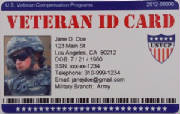|
|
|
|
|
|
VA's Best Kept Secret By Stephanie Braxton, MA August 26, 2015
Many veterans may not know about Vet Centers, or how they differ from a typical Veterans Affairs Medical Center (VAMC). Or, veterans hear about Vet Centers and assume it is a VAMC. Nothing could be further from the truth. Unfortunately, for millions of veterans, Vet Centers remain largely a secret entity. Just in case you haven’t noticed, Vet Centers are popping up all over the free world. The Philippines, Virgin Islands, and Guam are just a few areas of the world where you can visit a VA sponsored Vet Center. Why? Well, there are a number of appealing reasons why veterans and their family members find Vet Centers alluring. For starters, the convenience of visiting a store front Vet Center is a major selling point. Veterans and their family members love the notion of pulling into a parking lot from the street and stepping into a cozy Vet Center. Did we mention parking? Yes! You’ll find easy, adequate, and convenient parking at most Vet Centers. Have you tried finding a parking spot at your local VAMC lately? Aside from really good parking, the Vet Centers offer a civilian-like setting, confidential and private sessions, group entertainment, and most importantly, outstanding therapists. Civilian Setting Let’s face it, when you enter a VAMC you
realize rather quickly that you’re in a hospital setting. There are a few conspicuous items on the
wall that might give it away. Maybe, all of the battledress-wearing veterans wandering the lobby are another
clue? Perhaps, it’s the generic nature of the décor? Whatever it is that
reminds you that you’re in a government ran hospital, it is everything the Vet Center is not. The
vast majority of Vet Centers are located in store front properties, mixing in with the civilian business owners.
Just like visiting a private practice psychologist in your community, Vet Centers offer veterans and their family members
the very same kind of look and feel. You’ll enter an office setting that resembles any private counseling
setting. Vet Centers are warm, cozy, and relaxing. In fact, some are downright opulent.
One thing is certain, you will more than likely find the landscape of a Vet Center inviting, nurturing, and one that
fosters positive therapeutic change.
Confidentiality & Privacy During your first session with a Vet Center therapist, he/she will inform you of your confidentiality and privacy rights. You’ll learn that your sessions will be known to you and your therapist only. You will be guaranteed that your discussions with your Vet Center therapist will be between just the two of you (with a few limitations that your therapist will explain to you). If privacy is important to you, well, going to counseling session at a VAMC is going to be difficult for you to maintain your privacy. Visiting most counseling departments in a typical VAMC is like going to a nice restaurant and sitting in an exposed booth, where you hear everything a patron is discussing, and you see everyone around you. Visiting a Vet Center is like going to a very exclusive five-star restaurant with private booths, excellent service, and having a sensational entre. You can slip into a Vet Center without anyone ever noticing. That is not to suggest a veteran can’t get good counseling at a VAMC, they can. But, if ultimately privacy is important, a Vet Center may be a better choice for many veterans.
Group Entertainment Vet Centers offer a special brand of therapeutic bonding in the form of fishing trips, pot lucks, tour excursions, visits from local mental health practitioners, and other creative therapeutic outlets that make going to a Vet Center fun, exciting, accommodating, and extremely valuable. Many Vet Centers take great pride in creating an atmosphere of “connectedness,” whereby, a veterans’ entire family system is welcomed to the Vet Center for therapy or simply connecting with the Vet Center. Many Vet Centers are happy to welcome extended family members who may benefit from engaging with the Vet Center for the benefit of a veteran or veterans’ immediate family members.
Outstanding Therapists Most of the Vet Center therapists are highly trained mental health specialists, with unique skill sets in very specific areas. For instance, all Vet Centers have a designated Military Sexual Trauma Therapist, whose job it is to work with those veterans affected by military sexual trauma, such as rape, sexual abuse or sexual harassment. Many Vet Centers also have a designated Family Therapist, whose job it is to work with entire family systems. Additionally, many Vet Centers are assigned mental health specialists who are former veterans and bring a unique perspective to the counseling setting. Most of the mental health professionals in Vet Centers are licensed therapists, who must comply with VA standards of practice and the state in which they are licensed. You’ll find Licensed Clinical Social Workers (LCSW), Licensed Professional Counselors (LPC), Licensed Marriage Family Therapists (LMFT), and licensed Psychologists in many Vet Centers. Therapists who can easily command $200/hr., but, instead, offer their excellent services to veterans free of charge. |
|
|
|
|
|
|

